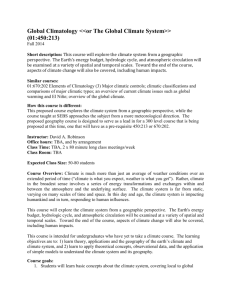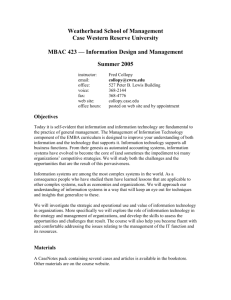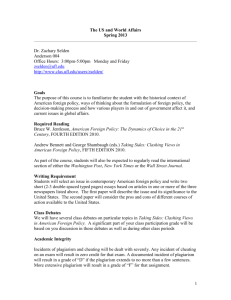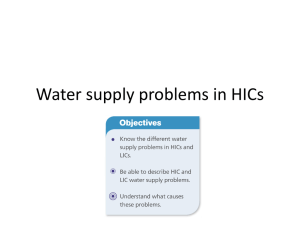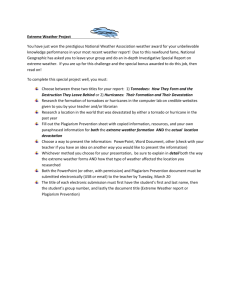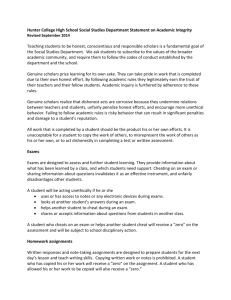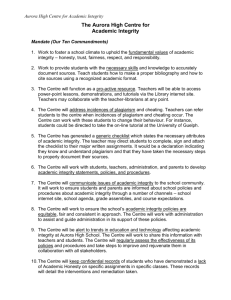Data Analysis in Geography (01:450:320:01)
advertisement
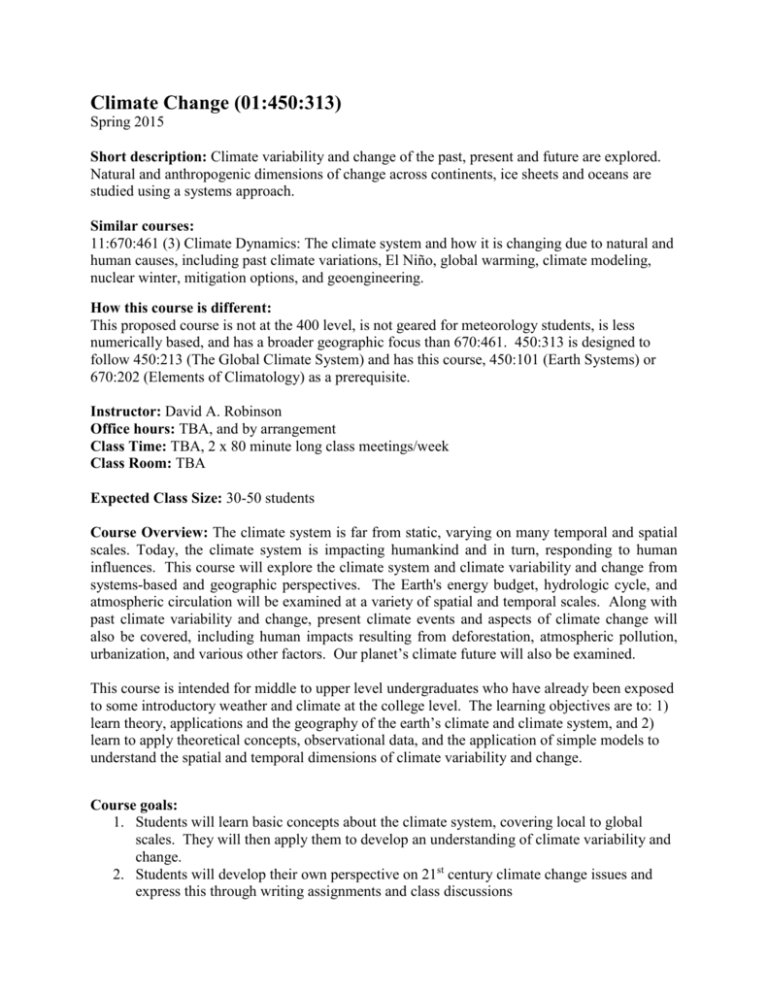
Climate Change (01:450:313) Spring 2015 Short description: Climate variability and change of the past, present and future are explored. Natural and anthropogenic dimensions of change across continents, ice sheets and oceans are studied using a systems approach. Similar courses: 11:670:461 (3) Climate Dynamics: The climate system and how it is changing due to natural and human causes, including past climate variations, El Niño, global warming, climate modeling, nuclear winter, mitigation options, and geoengineering. How this course is different: This proposed course is not at the 400 level, is not geared for meteorology students, is less numerically based, and has a broader geographic focus than 670:461. 450:313 is designed to follow 450:213 (The Global Climate System) and has this course, 450:101 (Earth Systems) or 670:202 (Elements of Climatology) as a prerequisite. Instructor: David A. Robinson Office hours: TBA, and by arrangement Class Time: TBA, 2 x 80 minute long class meetings/week Class Room: TBA Expected Class Size: 30-50 students Course Overview: The climate system is far from static, varying on many temporal and spatial scales. Today, the climate system is impacting humankind and in turn, responding to human influences. This course will explore the climate system and climate variability and change from systems-based and geographic perspectives. The Earth's energy budget, hydrologic cycle, and atmospheric circulation will be examined at a variety of spatial and temporal scales. Along with past climate variability and change, present climate events and aspects of climate change will also be covered, including human impacts resulting from deforestation, atmospheric pollution, urbanization, and various other factors. Our planet’s climate future will also be examined. This course is intended for middle to upper level undergraduates who have already been exposed to some introductory weather and climate at the college level. The learning objectives are to: 1) learn theory, applications and the geography of the earth’s climate and climate system, and 2) learn to apply theoretical concepts, observational data, and the application of simple models to understand the spatial and temporal dimensions of climate variability and change. Course goals: 1. Students will learn basic concepts about the climate system, covering local to global scales. They will then apply them to develop an understanding of climate variability and change. 2. Students will develop their own perspective on 21st century climate change issues and express this through writing assignments and class discussions Course goal assessment: Course goal 1 will be assessed through pre- and post- tests, which will demonstrate the course effectiveness in improving understanding of basic concepts. Course 2 will be assessed through assignments, which will determine the degree to which students are able critically engage with the course material and formulate their own perspective. Likely course textbook: Introduction to Modern Climate Change. by A. Dessler, Cambridge University Press or Climate Change and Climate Modeling. by J. D. Neelin, Cambridge University Press Plus readings from the forthcoming 5th assessment report of the Intergovernmental Panel on Climate Change: The Scientific Basis and from other timely publications. Class Format: Class time will devoted to lectures, class discussions and several labs. Final grade: The final grade will be consists of 100 points distributed as follows: Assignments (lab and otherwise): 25 Midterms: (2) 15 each Final exam 20 Term paper 25 Grading scale A:90.0-100% B+:87.5-89.9 B:80.0-87.4% C+:77.5-79.9% C:70.0-77.4% D:60.0-69.9 F:<60.0% Class policy Extra credit: Not available under any circumstances. Exams: Every effort must be made to take exams when scheduled. No unexcused make-up exams will be given without WRITTEN documentation. Those with valid excuses will be allowed to take exams in a method determined by the instructor. Assignments/Essay/Paper(s): Each must be submitted in HARDCOPY format on or before the day it is due (5PM deadline). A submission will lose 5% for each day it is late. Attendance: You are expected to attend class; attendance is one of the best prognosticators of a student's performance. If you expect to miss one or two classes, please use the university absence reporting website https://sims.rutgers.edu/ssra/ to indicate the date and reason for your absence. An email is automatically sent to me. Tardiness and Leaving Class Early: Our University is geographically challenged. Students must commute considerable distances between classes and I am aware of problems you encounter in trying to come to class on time. I recognize that some tardiness is inevitable; however habitually arriving in class late and departing early is disruptive and rude. I ask that you make every effort possible to get to class on time, and once there, remain. If you must leave early, make sure to sit as close to the door and depart as unobtrusively as possible. Personal Conversation: It is rude and disruptive to engage in personal conversation during class. Students who persist in this disruptive behavior may be asked to leave. Refusal to leave class once requested will result in disciplinary action at the Dean's level. Cell phones should be turned off while class is in session; this includes no text messaging. Laptops may be used to take notes, not for anything else. Academic Integrity: The Geography Department fully endorses a no-tolerance cheating and plagiarism policy. If you are caught cheating, you may be failed and disciplinary action may be taken. Short version: Don’t cheat. Don’t plagiarize. Longer version: Cheating on tests or plagiarizing materials in your papers deprives you of the educational benefits of preparing these materials appropriately. It is personally dishonest to cheat on a test or to hand in a paper based on unacknowledged words or ideas that someone else originated. It is also unfair, since it gives you an undeserved advantage over your fellow students who are graded on the basis of their own work. In this class, cheating will be taken very seriously. All suspected cases of cheating and plagiarism will be automatically referred to the Office of Judicial Affairs and penalties will be recommended appropriate to the gravity of the infraction. The university's policy on Academic Integrity is available at http://academicintegrity.rutgers.edu/files/documents/AI_Policy_9_01_2011.pdf 1 I advise you to familiarize yourself with this document, both for this class and for your other classes and future work. Since what counts as plagiarism is not always clear, here is the definition given in Rutgers' policy: Plagiarism: Plagiarism is the use of another person’s words, ideas, or results without giving that person appropriate credit. To avoid plagiarism, every direct quotation must be identified by quotation marks or appropriate indentation and both direct quotation and paraphrasing must be cited properly according to the accepted format for the particular discipline or as required by the instructor in a course. Some common examples of plagiarism are: • Copying word for word (i.e. quoting directly) from an oral, printed, or electronic source without proper attribution. 1 This web link was corrected on July 13, 2012. S. Lawrence • Paraphrasing without proper attribution, i.e., presenting in one’s own words another person’s written words or ideas as if they were one’s own. • Submitting a purchased or downloaded term paper or other materials to satisfy a course requirement. • Incorporating into one’s work graphs, drawings, photographs, diagrams, tables, spreadsheets, computer programs, or other nontextual material from other sources without proper attribution.2 A SPECIAL NOTE: Students often assume that because information is available on the Web it is public information, does not need to be formally referenced, and can be used without attribution. This is a mistake. All information and ideas that you derive from other sources, whether written, spoken, or electronic, must be attributed to their original source. Such sources include not just written or electronic materials, but people with whom you may discuss your ideas, such as your roommate, friends, or family members. They deserve credit for their contributions too! Judgments about plagiarism can be subtle. If you have any questions, please feel free to ask me for guidance. . http://academicintegrity.rutgers.edu/files/documents/AI_Policy_9_01_2011.pdf Updated with the University’s current language on July 13, 2012. S. Lawrence 2 SCHEDULE (hypothetical) January 22 & 24 Introducing climate & climate change.....with a NJ focus ASSEMBLING THE CLIMATE SYSTEM January 29 Composition & structure of the atmosphere January 31 Solar radiation, energy balance & temperature February 5 Atmospheric pressure & wind February 7 Atmospheric moisture, clouds & precipitation February 12 Atmospheric circulation & pressure distributions February 14 Air masses and fronts February 19 EXAM 1 EXPLORING CLIMATE CHANGE February 21 & 26 Earth’s climate regions Feb 28, Mar 5 & 7 Past climates March 12, 14 & 26 Natural causes of past climate change (including lab exercise) March 28 EXAM 2 April 2 & 4 Climate variability and change: 1900 to present April 9 & 11 Natural causes of recent climate variability and change April 16 &18 Anthropogenic causes of climate variability and change April 23 & 25 Future climate variability and change (including lab exercise) Apr 30 & May 2 Impacts of climate change May 7, noon EXAM 3 (not cumulative) (held in regular classroom)
